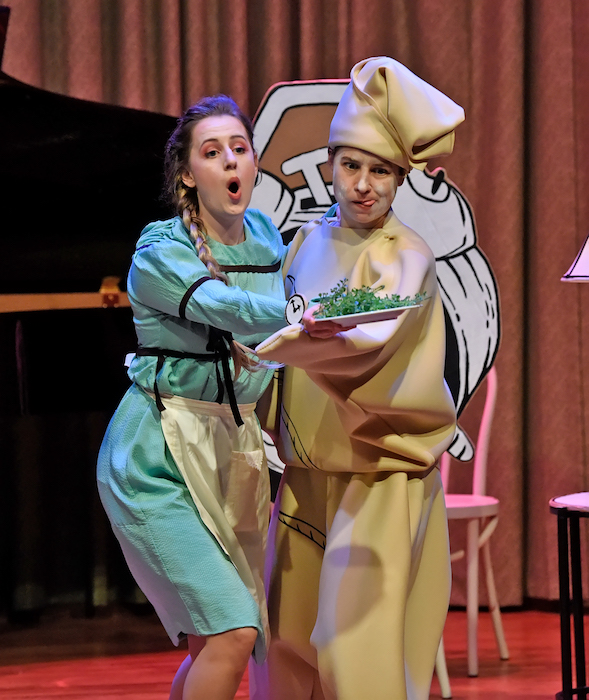Appealing music lifts Fort Worth Opera’s absurd, unsettling “Companionship”

Maren Weinberger Maddry (left) and Kate Tombaugh in “Companionship” at Fort Worth Opera. Photo: Karen Almond
Dark humor, absurdist fiction, and an appealing jazzy-lyrical score came together Wednesday night when Fort Worth Opera presented the world premiere of Rachel J. Peters’ chamber opera, Companionship at the Botanic Garden.
Based on the eponymous short story by Arthur Phillips (who, like composer Peters, was present for the event), Companionship tells the story of Leslie Sinclair, a contemporary young woman who aspires to be a baker. We learn immediately that she’s obsessive compulsive, and recently bereaved (of a lover named Hiram), has psychological eating issues, was released from a psychiatric ward, and is dependent on her divorced parents .
The absurdity emerges quickly whhen an unbaked mound of bread dough begins conversing with Leslie and becomes her best friend. Not a nice Pillsbury Doughboy-like best friend, but a demanding, complaining, jealous best friend, who eventually creates a mate, also made of dough, and a slew of equally demanding offspring.
Meanwhile, Leslie’s weak father, domineering mother, jealously condescending twin sister, and twin sister’s boyfriend interact on various levels with Leslie as well as with the mound of dough, which gradually takes over Leslie’s life.
In spite of her oddities, Leslie is a clearly a modern-day Everywoman (or, if you wish, EveryAmerican). Companionship may easily be viewed as a parable about American consumerism, social isolation, digital addiction, and poisonous relationships. The influence of Kafka looms large in the narrative, as does the Melville of Bartleby the Scrivener, and it’s certainly up to the viewer to decide whether this is all a dream, the product of a delusional mind, or a magical experience.
Peters served as librettist as well as composer for the opera, producing nine tight, short scenes running seventy minutes. A prolific composer of vocal music, Peters here produces a resolutely tonal but constantly inventive, melodic and voice-friendly score. There is an ongoing stream of ariosos and lyrical recitative—generally in a mild, light-jazz idiom, at one point segueing into a parody-tribute to Sigmund Romberg-style operetta.
Soprano Maren Weinberger Maddry in the central role of Leslie sang with a sure but sweet tone. She maneuvered neatly through the intricacies of an unstable but sympathetic character, creating a memorable and dramatically convincing performance.
Mezzo-soprano Kate Tombaugh maintained a clean, substantial quality and lively presence in a decidedly unglamorous role of the domineering Dough. Bass Benjamin Sieverding brought an appropriately crude characterization to the role of the Dough’s Mate, convincingly creating a character whose spotlight moment arrives with the delivery of a well-timed belch.
Baritone Samuel Schultz likewise maintained muscular vocal quality while portraying Leslie’s weak but nurturing father. Mezzo-soprano Hilary Ginther brought the proper condescending attitude as the jewelry-bedecked mother, with a gorgeously rich, textured timbre.
Soprano Jeni Houser sneered in character as Leslie’s not-so-identical twin Viv, but delivered a smoothly lyrical musical performance. Tenor David Walton swaggered seductively, and with fine vocal resonance, as Viv’s boyfriend Tom. Chorus master Alfrelynn Roberts trained the cooperative and musically superb chorus of children.
Stage director Beth Greenberg produced flowing, energetic action onstage at the Botanic Garden’s Lecture Hall. Laura Anderson Barbata designed a simple but effective production, with whimsical, one-dimensional props emphasizing the absurdity of the narrative.
Music director Adam Marks led the performance from a piano at the back of the stage, with nuance, and insight throughout. The 258-seat auditorium proved acoustically and visually congenial to this ensemble-driven, sometimes funny, ultimately disturbing work.
Concise in scope and skillfully constructed, Companionship is a fresh presence on the regional opera scene, and should be a welcome and unique addition to the chamber opera repertoire.
Companionship will be repeated 7:30 p.m. Friday and 5 p.m. Sunday at Fort Worth Botanic Garden. fwopera.org; 817-731-0726.